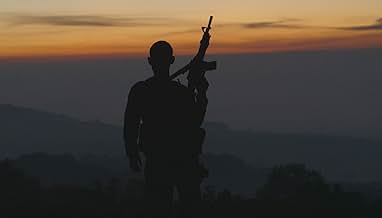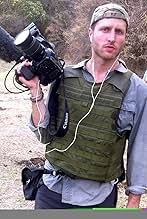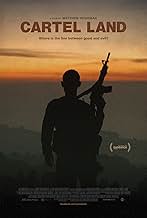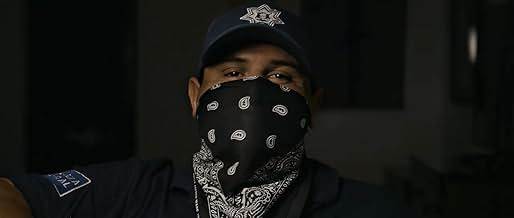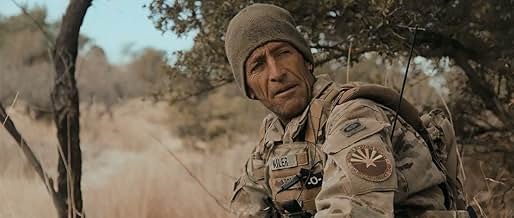AVALIAÇÃO DA IMDb
7,3/10
19 mil
SUA AVALIAÇÃO
O cineasta Matthew Heineman examina o estado do atual problema das drogas ao longo da fronteira entre os EUA e o México.O cineasta Matthew Heineman examina o estado do atual problema das drogas ao longo da fronteira entre os EUA e o México.O cineasta Matthew Heineman examina o estado do atual problema das drogas ao longo da fronteira entre os EUA e o México.
- Indicado a 1 Oscar
- 19 vitórias e 38 indicações no total
Nicolás Sierra
- Self
- (as as Nicolás Sierra 'El Gordo')
Alfredo Castillo Cervantes
- Self - Mexican political
- (as Alfredo Castillo)
María Imilse Arrué
- Self
- (as María Imilse)
Avaliações em destaque
This documentary is about Mexico and cartels, but it is also about vigilantism in general. Is it OK to take the law into your own hands? Does this freedom corrupt? The documentary explores two (related) instances of vigilantism, and it does so in a critical, but nuanced way. It reflects upon the motives of the people involved, and their situation. This exploration is what really makes this documentary great. It throws some light on the situation in Mexico in a way that is both thrilling and heartbreaking - but by focusing on the acts of the vigilantes, the documentary becomes timeless.
The people behind this went to great lengths to get some really(!) impressive footage. How they convinced people involved to let them film all of this is beyond me.
A warning though: There were some scenes here where I had to look away because of the images shown.
The people behind this went to great lengths to get some really(!) impressive footage. How they convinced people involved to let them film all of this is beyond me.
A warning though: There were some scenes here where I had to look away because of the images shown.
Deep in the desert, where no legitimate government rules, a terrorist organization operates freely. Established governments fear them. They're well-financed, violent and ruthless. They control large swaths of land, including some cities and towns, causing local residents to live in fear. The members of this organization think nothing of murdering their enemies or killing just to make a point. They murder men, women and children, and even celebrate those deaths. They often decapitate their victims and sometimes use the internet to publicize videos and photos of their brutality. They even evoke the name of their god to justify their actions.
I'm not talking about the Middle East or ISIS. I'm talking about Mexican drug cartels.
The documentary "Cartel Land" (R, 1:38) shows everything I just described and more, but focuses mainly on vigilante groups who fight the cartels – on both sides of the U.S.-Mexican border. The film's title refers to areas of Mexico – and areas of the United States as well. U.S. Marine veteran Tim "Nailer" Foley leads a small paramilitary group called Arizona Border Recon whose volunteer members carry semi-automatic rifles and patrol Arizona's Altar Valley ("Cocaine Alley") for any sign of drug traffickers operating on the U.S. side of the border. Meanwhile, Jose Mireles leads the Autodefensas, whose members carry similar weapons in their quest to root out members of the ruthless drug cartel which operates in the area around the western Mexican state of Michoacán. Both of these vigilante groups operate outside of their government's good graces but both governments refrain from direct action against the groups, even seeming to work with them on some level.
The film alternates between following both groups as they struggle to turn back the advancing tide of cartels operating in their areas and also deal with manpower and leadership issues and with the friction between them and their respective governments. The story of these two vigilante groups is bookended by scenes shot during methamphetamine production by cartel affiliates at a remote outdoor location in Mexico. With their faces covered, this small group of men goes about their business unfettered and they even talk to the camera. At one point, their leader admits that what they're doing is wrong, but doesn't seem to care. He says that they'll continue cooking meth "as long as God allows it". Similarly, the leaders of both Arizona Border Recon and the Autodefensas justify their actions, even as some of their methods resemble those of the cartels.
"Cartel Land" does things that I've never seen before in any documentary and does others better than I've ever seen them done. I've rarely praised either of these in other documentaries, but the cinematography and the score are both magnificent. Even more impressive than how it was shot is where it was shot. Besides gaining practically unprecedented access to that secret meth lab, director Matthew Heineman embeds with these vigilante groups, following them on their missions and getting up close and personal with some of the action in some obviously dangerous situations. (The film won the directing and cinematography awards in its category at the 2015 Sundance Film Festival.) The editing is also extremely impressive. The film contains more surprising reveals and vital story developments than in many traditional movie thrillers. Besides Heineman's obvious talents (and guts), it probably didn't hurt that one of the doc's executive producers is Kathryn Bigelow, Oscar-winning director of "The Hurt Locker" and "Zero Dark Thirty". Bigelow and Heineman's film is quite simply one of the best documentaries I have ever seen and only the second one that I have ever given this grade: "A".
I'm not talking about the Middle East or ISIS. I'm talking about Mexican drug cartels.
The documentary "Cartel Land" (R, 1:38) shows everything I just described and more, but focuses mainly on vigilante groups who fight the cartels – on both sides of the U.S.-Mexican border. The film's title refers to areas of Mexico – and areas of the United States as well. U.S. Marine veteran Tim "Nailer" Foley leads a small paramilitary group called Arizona Border Recon whose volunteer members carry semi-automatic rifles and patrol Arizona's Altar Valley ("Cocaine Alley") for any sign of drug traffickers operating on the U.S. side of the border. Meanwhile, Jose Mireles leads the Autodefensas, whose members carry similar weapons in their quest to root out members of the ruthless drug cartel which operates in the area around the western Mexican state of Michoacán. Both of these vigilante groups operate outside of their government's good graces but both governments refrain from direct action against the groups, even seeming to work with them on some level.
The film alternates between following both groups as they struggle to turn back the advancing tide of cartels operating in their areas and also deal with manpower and leadership issues and with the friction between them and their respective governments. The story of these two vigilante groups is bookended by scenes shot during methamphetamine production by cartel affiliates at a remote outdoor location in Mexico. With their faces covered, this small group of men goes about their business unfettered and they even talk to the camera. At one point, their leader admits that what they're doing is wrong, but doesn't seem to care. He says that they'll continue cooking meth "as long as God allows it". Similarly, the leaders of both Arizona Border Recon and the Autodefensas justify their actions, even as some of their methods resemble those of the cartels.
"Cartel Land" does things that I've never seen before in any documentary and does others better than I've ever seen them done. I've rarely praised either of these in other documentaries, but the cinematography and the score are both magnificent. Even more impressive than how it was shot is where it was shot. Besides gaining practically unprecedented access to that secret meth lab, director Matthew Heineman embeds with these vigilante groups, following them on their missions and getting up close and personal with some of the action in some obviously dangerous situations. (The film won the directing and cinematography awards in its category at the 2015 Sundance Film Festival.) The editing is also extremely impressive. The film contains more surprising reveals and vital story developments than in many traditional movie thrillers. Besides Heineman's obvious talents (and guts), it probably didn't hurt that one of the doc's executive producers is Kathryn Bigelow, Oscar-winning director of "The Hurt Locker" and "Zero Dark Thirty". Bigelow and Heineman's film is quite simply one of the best documentaries I have ever seen and only the second one that I have ever given this grade: "A".
Editors note:
Almost always people comment on films on this website in quite a good way. So I never felt the urge to write/contribute something....
The film:
First of all I never wrote a review on this website before. And to be honest i don't think this will count as a review. Actually it was never my intention to write a review but more so to ask a critical question... Is this still a documentary? The quality of the images, the story and of the film in general are mind blowing! It gets you thinking and shows you the good, the bad and the ugly (pun intended).The story itself and the people involved are real, but in my opinion this is a reenactment! Staged, beautifully done but staged... The subject and the way they showed it is compelling, brutal at times, and it will get you thinking but I can't lose the feeling i watched a movie/film and not a documentary... Which is either brilliant or bad... Help me out, your thoughts pls.
Almost always people comment on films on this website in quite a good way. So I never felt the urge to write/contribute something....
The film:
First of all I never wrote a review on this website before. And to be honest i don't think this will count as a review. Actually it was never my intention to write a review but more so to ask a critical question... Is this still a documentary? The quality of the images, the story and of the film in general are mind blowing! It gets you thinking and shows you the good, the bad and the ugly (pun intended).The story itself and the people involved are real, but in my opinion this is a reenactment! Staged, beautifully done but staged... The subject and the way they showed it is compelling, brutal at times, and it will get you thinking but I can't lose the feeling i watched a movie/film and not a documentary... Which is either brilliant or bad... Help me out, your thoughts pls.
Greetings again from the darkness - from the Dallas International Film Festival. Even in this digital age where information exists from all sides of a conflict
often with corresponding video, the general public somehow remains complacent to issues that don't directly and obviously affect their lifestyle. Skilled documentarian Matthew Heineman ignores the rhetoric of political speeches and plops the war against drug cartels right into our lap.
This is a different approach to a topic with which we are all at least somewhat familiar. The involved parties include the affected communities (in Mexico and Arizona), the governments and affiliated agencies (DEA, Border Patrol), the ever-expanding vigilante groups of citizens (Arizona Border Recon, AutoDefensas), and of course the cartels (focus on Knights Templar).
Intimacy is the key here, as Mr. Heineman takes us inside these groups with an up-close look at leaders. Especially fascinating is Dr. Mireles who is the face of the AutoDefensas – a group he pledges will protect communities from the cartels, who clearly have no regard for human life. The film doesn't shy away from the expected issues: citizen pushback, greed, abuse of power, and corruption. As AutoDefensas teams with the Mexican government to create the Rural Defense Force, we can't help but wonder if the rumors of differing goals are at play in the drug battles. Citizens want safety, but what is it that the government wants? Is the goal drug-free streets or is it a cut of the action.
Learning how desperate the vigilantes are to protect their homes, turf and way of life, we are left with little doubt of their mission. It's everyone else that we must keep questioning and holding accountable. This is not an easy documentary to watch, but it's necessary if you have previously lost interest as the next politician proclaims he will continue "the war on drugs".
This is a different approach to a topic with which we are all at least somewhat familiar. The involved parties include the affected communities (in Mexico and Arizona), the governments and affiliated agencies (DEA, Border Patrol), the ever-expanding vigilante groups of citizens (Arizona Border Recon, AutoDefensas), and of course the cartels (focus on Knights Templar).
Intimacy is the key here, as Mr. Heineman takes us inside these groups with an up-close look at leaders. Especially fascinating is Dr. Mireles who is the face of the AutoDefensas – a group he pledges will protect communities from the cartels, who clearly have no regard for human life. The film doesn't shy away from the expected issues: citizen pushback, greed, abuse of power, and corruption. As AutoDefensas teams with the Mexican government to create the Rural Defense Force, we can't help but wonder if the rumors of differing goals are at play in the drug battles. Citizens want safety, but what is it that the government wants? Is the goal drug-free streets or is it a cut of the action.
Learning how desperate the vigilantes are to protect their homes, turf and way of life, we are left with little doubt of their mission. It's everyone else that we must keep questioning and holding accountable. This is not an easy documentary to watch, but it's necessary if you have previously lost interest as the next politician proclaims he will continue "the war on drugs".
Review: What a brilliant documentary! It really did seem like it was a feature film because it's full of action and intense drama. The director, Matthew Heineman, was lucky to gain the trust of Dr. José Mireles and Tim "Nailer" Foley, to go behind the scenes and film the gruesome problems in the Mexican state of Michoacan and the Arizona border, which is used by the drug cartels to bring drugs into America. Both stories involve heavy corruption, kidnap, horrifying murder, rape and black mail. Matthew put together enough material to tell the terrifying story about the drug cartels who will kill anybody who step in there way. Tim is an ex veteran who suffered abuse from his father and left home at the early age of 15. After working in various jobs and losing his house due to the credit crunch, he started to work alongside immigrants, who worked illegally and didn't pay any taxes. He then decided to use his savings to put together an elite force called the Arizona Border Recon in Arizona's Altar Valley, to stop the drug cartels from bringing there drugs into America and to stop the war causing any problems across the border. His small force use heavy artillery and patrol during day and night to protect his home and infiltrate the cartels various methods of trafficking drugs. As there isn't any laws to protect them, they basically take matters into there own hands and risk there life's for there country and to make sure that things don't get out of hand. While Tim is battling against the cartels, who are using the newest technology to communicate, Dr. José Mireles is also battling against the cartels but his war is to protect Michoacan and to gain control of the various towns which have many violent gang members, called the Knight Templars, who are causing havoc in there communities. After giving speeches in the various towns, he manages to put together a force called the Autodefensas, who use heavy artillery and group together in numbers to get the perpetrators out of the many villages. He successfully cleans up many of the small towns and he becomes highly respected around Michoacan. He then ends up in a plane crash, which paralysed a side of his face and seriously damages his back, so he takes time out from the Autodefensas and goes into hiding because he doesn't know if the crash was a hit from the cartels. On the anniversary of the Autodefensas, José comes out of hiding and takes back control of his elite force but everything has got out of control and a lot of the Autodefensas are using there powers to do bad things. As they haven't got the right to have guns and apply force around Michoacan, the government step in and build there own force, which pushes José out of control. All of his fellow workers join the government force because they are allowed to use guns by law and Jose's life becomes in danger because he has broken so many laws when he was in control. When they eventually catch up with José, they put him in a Federal Centre for Social Re-adaptation in Hermosillo, Sonora. Although he still gains support from the villagers, he has basically become a political prisoner who is kept behind bars to silence him and take full control of his elite force. It has all the makings for a brilliant film but as this is a documentary about true events, I found it thrilling and quite emotional, especially when you hear what some of the community went through. The story that was told by the lady who watched her husband being burnt to death, was awful and it really shows how far these cartels are willing to go, to bring fear into people's life's. There also are some intense shoot-outs which must have been extremely scary for the director, who was in the heart of the action. Anyway, this movie definitely gave a graphic insight into a world which I totally didn't know existed and right from the beginning, when the members of the cartels are cooking the "Meth", I was glued to the TV until the end. Great!
Round-Up: This brilliant documentary was put together by Matthew Heineman who brought you Overcoming The Storm, which is about several residents returning to there homes in New Orleans after hurricane Katrina, Our Time, which is about 4 youths who travel across America to ask there peers serious questions about life in America today and Escape Fire: The Fight Of Rescue American Healthcare, which uncovers the U.S. Healthcare systems true design. I personally would watch Matthew's other documentaries because he really did get to the heart of the problem with this movie and put his life on the line, to the point were he didn't put on his bullet proof vest during one of the shoot-outs because he wanted to catch all of the action on camera. The movie did make me investigate what really did happen to José, who is still in prison but I did find it a bit weird that no one looked into the camera during the scenes in the various villages and the shoot-outs. That did make me question if the documentary was real but when I watched the bonus material on the DVD, I realised that these events really did happen. The cartels value for life did shock me and I can't imagine how it must be to live your life in fear, 24 hours a day. I think you can tell that I really enjoyed this film and I hope that it gets the recognition that it deserves.
Budget: N/A Worldwide Gross: $1.1million
I recommend this movie to people who are into their documentary/action/drama movies about a physician in Michoacan, Mexico, who leads a citizen uprising against the drug cartel that has wreaked havoc on the region for years. 8/10
Round-Up: This brilliant documentary was put together by Matthew Heineman who brought you Overcoming The Storm, which is about several residents returning to there homes in New Orleans after hurricane Katrina, Our Time, which is about 4 youths who travel across America to ask there peers serious questions about life in America today and Escape Fire: The Fight Of Rescue American Healthcare, which uncovers the U.S. Healthcare systems true design. I personally would watch Matthew's other documentaries because he really did get to the heart of the problem with this movie and put his life on the line, to the point were he didn't put on his bullet proof vest during one of the shoot-outs because he wanted to catch all of the action on camera. The movie did make me investigate what really did happen to José, who is still in prison but I did find it a bit weird that no one looked into the camera during the scenes in the various villages and the shoot-outs. That did make me question if the documentary was real but when I watched the bonus material on the DVD, I realised that these events really did happen. The cartels value for life did shock me and I can't imagine how it must be to live your life in fear, 24 hours a day. I think you can tell that I really enjoyed this film and I hope that it gets the recognition that it deserves.
Budget: N/A Worldwide Gross: $1.1million
I recommend this movie to people who are into their documentary/action/drama movies about a physician in Michoacan, Mexico, who leads a citizen uprising against the drug cartel that has wreaked havoc on the region for years. 8/10
Você sabia?
- CuriosidadesThe Autodefensas group shown in the film was created by civilians to stand up against the cartels because the government is overrun with corruption. Individuals speak about how little the Mexican president (Enrique Peña Nieto) is doing. In the film, the Autodefensas is shown celebrating its one year anniversary on February 24, 2014. On that exact same day, TIME Magazine ran an issue with the Mexican President Enrique Peña Nieto with the headline "Saving Mexico." Nieto reportedly paid TIME $44,000 for this cover article coincidentally released on the same day as the Autodefensas anniversary.
- Citações
José Manuel 'El Doctor' Mireles: Get everything you can out of him, and then put him in the ground.
- Trilhas sonorasEn Las Calles
Written by H. Scott Salinas and Jose Cancela
Principais escolhas
Faça login para avaliar e ver a lista de recomendações personalizadas
- How long is Cartel Land?Fornecido pela Alexa
Detalhes
- Data de lançamento
- País de origem
- Central de atendimento oficial
- Idiomas
- Também conhecido como
- Земля картелів
- Locações de filme
- Empresas de produção
- Consulte mais créditos da empresa na IMDbPro
Bilheteria
- Faturamento bruto nos EUA e Canadá
- US$ 704.352
- Fim de semana de estreia nos EUA e Canadá
- US$ 15.581
- 5 de jul. de 2015
- Faturamento bruto mundial
- US$ 1.145.923
- Tempo de duração
- 1 h 40 min(100 min)
- Cor
- Proporção
- 2.35 : 1
Contribua para esta página
Sugerir uma alteração ou adicionar conteúdo ausente







